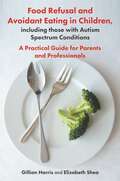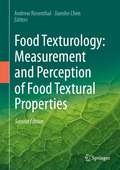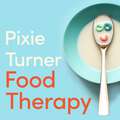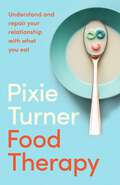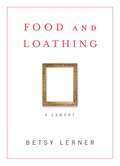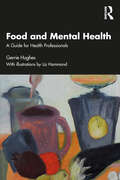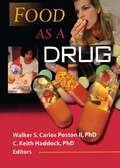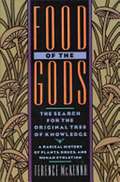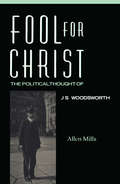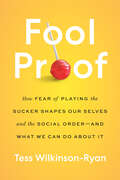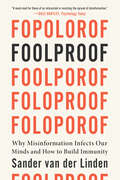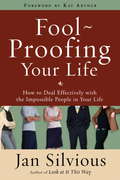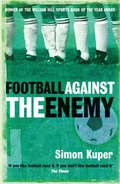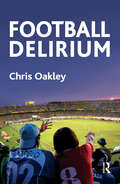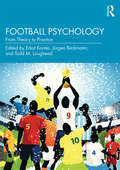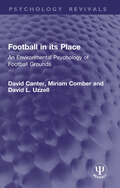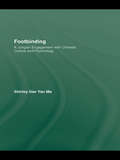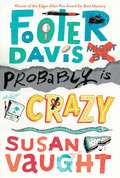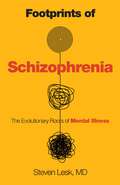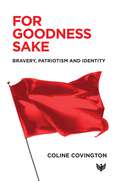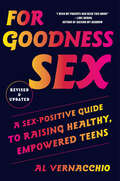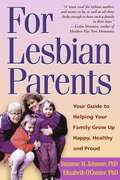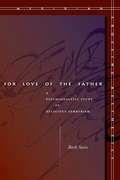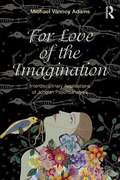- Table View
- List View
Food Refusal and Avoidant Eating in Children, including those with Autism Spectrum Conditions: A Practical Guide for Parents and Professionals
by Gillian Harris Elizabeth SheaMany children with Autism Spectrum Disorder (ASD) have a restricted dietary range, and this book provides parents with advice and training on how to deal with this condition and achieve a healthier and more balanced diet. Now described as Avoidant or Restrictive Food Intake Disorder (ARFID), it is due to sensory hypersensitivity, and it can impact upon the health of the child, upon the family, and upon social integration. Based upon successful training packages the authors provide for parents and professionals, this book enables the reader to understand the condition and work with it, gradually increasing the range of food a child is able to eat. It includes 'box outs' with case studies, points of interest and action points to make this an accessible and resourceful read.
Food Texturology: Measurement and Perception of Food Textural Properties
by Jianshe Chen Andrew RosenthalThe concept behind this book is to take a holistic view of food texture, starting with the determination of food texture, its perception in the mouth, and its measurement by both sensory and instrumental methods, and to examine the relation between them. The book has been divided into four sections: Fundamentals, Sensory and Human Interactions, Instrumental Analysis, and Food Products. Essentially we cover the techniques used for measuring food texture, and then apply them to the different product groups. Readers of the first edition will notice the title has changed, with the adoption of the term texturology. In the long history of food texture research, texturology has been occasionally used in literature. The term texturology has not been widely accepted by texture researchers (texturologists) because of their concern over whether the theories and techniques are broad and strong enough to support texture research as a scientific discipline. During the 24 years since the publication of the first edition, the editors have observed vast developments in theories as well as the assessment methodology of food texture (both sensory and instrumental) and these have shaped our understanding. This second edition brings the science up to date by introducing topics not previously covered (e.g. psychophysics, tribology, oral processing, texture maps and special foods for dysphagia patients). It includes an exposé of the instruments to measure food texture, and also considers techniques for measuring consumer perception of food texture (in addition to the sensory properties). Additionally, it amends omissions from the first edition such as dairy products; fish; bakery products; and, sugar confectionery, asproduct groups. All in all it is expanded and updated in its coverage of food texturology, as a coherent scientific discipline.
Food Therapy
by Pixie TurnerHow does food make you feel?If it's a source of guilt, shame, or punishment, have you ever stopped to ask why?We've become so used to the concept of 'good' and 'bad' foods that we barely notice the drastic statement we're making when we say we are a bad person for eating something sweet. In FOOD THERAPY, Pixie Turner presents a new approach to our relationship with food. Instead of focusing on rules, reduction and restriction, this practical book will help you uncover the psychological roots of your eating habits - and introduce you to a new mindset that will free you from a destructive relationship with food. Whether you struggle with disordered eating, body image problems, or feel trapped by diet culture, Pixie's experience as a registered nutritionist and psychotherapist allows her to guide you through how your feelings affect what you eat. By showing how our eating habits are often an attempt at solving underlying problems, and how to face the difficult emotions and memories behind them, FOOD THERAPY empowers you to eat freely for life and feel truly at home in your body.The diagrams mentioned in the audiobook can be found on Pixie Turner's website: www.pixieturnernutrition.com
Food Therapy
by Pixie TurnerHow does food make you feel?If it's a source of guilt, shame, or punishment, have you ever stopped to ask why?We've become so used to the concept of 'good' and 'bad' foods that we barely notice the drastic statement we're making when we say we are a bad person for eating something sweet. In FOOD THERAPY, Pixie Turner presents a new approach to our relationship with food. Instead of focusing on rules, reduction and restriction, this practical book will help you uncover the psychological roots of your eating habits - and introduce you to a new mindset that will free you from a destructive relationship with food. Whether you struggle with disordered eating, body image problems, or feel trapped by diet culture, Pixie's experience as a registered nutritionist and psychotherapist allows her to guide you through how your feelings affect what you eat. By showing how our eating habits are often an attempt at solving underlying problems, and how to face the difficult emotions and memories behind them, FOOD THERAPY empowers you to eat freely for life and feel truly at home in your body.
Food and Behavior: A Natural Connection
by Barbara Reed StittIn this book, Barbara Reed Stitt, a former Chief Probation officer and creator of a nutritional program which has helped thousands to lead healthy and productive lives, shows the link between food and behavior.
Food and Loathing: A Lament
by Betsy LernerNever before Food and Loathing has the intimate relationship between mood swings and food swings been so honestly chronicled. As a bright but chubby girl, Betsy Lerner believed that thinness was the key to success with friends and boys. By junior high, she had precisely divided the world of food into two camps: the dietetic and the forbidden. Becoming a member of the then-fledgling Overeaters Anonymous, she formed a cult-like devotion to the program and lost fifty pounds in a matter of months, only to gain it all back and more. "I am powerless over Hostess cakes," she writes, "and my life has become unmanageable. "Her twenties are marked by yo-yo dieting, depressive episodes, and a sadistic shrink who dubs her "the boy who cried wolf. " Then, just as Lerner begins to realize her dream of becoming a writer, entering Columbia's prestigious MFA program, she spirals into a suicidal depression and lands at New York State Psychiatric Institute. There, a young doctor helps her take her first steps toward selfhood and unraveling the dual legacy of compulsion and depression. A powerfully rendered story for anyone who has every wielded a fork in despair or calculated her worth on the morning scale.
Food and Mental Health: A Guide for Health Professionals
by Gerrie HughesWritten by an experienced psychotherapist, this book provides professionals in the fields of health and wellbeing with a guide to human relationships with food, and their impact on mental health. Acknowledging how food choices profoundly effect a person’s experience in the world, Gerrie Hughes offers knowledge and support around how to understand and negotiate the relationship between food and mind. Chapters offers facts, information and theories on key topics such as self-image, ‘good’ nutrition, sustainability and rituals. Each chapter uses vignettes, case studies and reflective activities to stimulate thought about the reader’s own assumptions and experience and offer approaches to how they might use their expertise with the people with whom they work. Providing an accessible and easy to read guide into the role food plays in our lives, this book will be of interest to a range of healthcare practitioners, including mental health nurses, occupational therapists, psychotherapists, and counsellors.
Food as a Drug
by Walker S Poston C Keith HaddockFood as a Drug provides psychologists, psychiatrists, and counselors with a unique discussion about possible addictive qualities of some foods to assist clients who are struggling with obesity or eating disorders. Examining the pros and cons of treating eating disorders with an addictions model, this book also explores the tremendous societal and personal costs of eating disorders and obesity, such as increased risk of heart disease, health care costs, and death. Thorough and concise, Food as a Drug will assist you in providing better services to clients with these types of dilemmas.Comprehensive and current, this reference provides information on relevant topics, such as diet and behavior relationships; cross-cultural perspectives on the use of foods for medicinal purposes; regulatory perspectives on drugs, foods, and nutritional supplements; and whether foods have pharmacological properties. Food as a Drug address several important topics, such as: focusing on sugar to determine the effects of food additives on children's behavioral disorders, such as attention deficit disorder and hyperactivity addressing the role that your diet plays on serotonin levels, carbohydrate craving, and depression examining the phenomenological, psychological, and physiological correlations between overeating and how foods may be used to alleviate negative moods discussing the pros and cons of treating obesity and eating disorders with addiction modelsWritten by experts in the field, this book offers you in-depth studies and information about the nature of food as a potentially addictive substance. Food as a Drug will help you understand these difficult-to-treat conditions and offer clients better and more effective services.
Food of the Gods: The Search for the Original Tree of Knowledge a Radical History of Plants, Drugs, and Human Evolution
by Terence McKennaAn exploration of humans' symbiotic relationships with plants and chemicals presents information on prehistoric partnership societies, the roles of spices and spirits in the rise of dominator societies; and the politics of tobacco, tea, coffee, opium, and alcohol. <p><p> Why, as a species, are humans so fascinated by altered states of consciousness? Can altered states reveal something to us about our origins and our place in nature? In Food of the Gods, ethnobotanist Terence McKenna's research on man's ancient relationship with chemicals opens a doorway to the divine, and perhaps a solution for saving our troubled world. McKenna provides a revisionist look at the historical role of drugs in the East and the West, from ancient spice, sugar, and rum trades to marijuana, cocaine, synthetics, and even television--illustrating the human desire for the "food of the gods" and the powerful potential to replace abuse of illegal drugs with a shamanic understanding, insistence on community, reverence for nature, and increased self-awareness.
Fool For Christ
by Allen MillsJames Shaver Woodsworth (1874-1942) stands as one of the half-dozen most important national political figures in twentieth-century Canadian history. Allen Mills acknowledges his outstanding achievements while providing a critical account of the Woodsworth legacy and revising the received opinion of him as a man of unbending conviction and ever-coherent principle.A product of western Canada's pioneer society and a stern Methodist household, Woodsworth grew up to make his way into social service and politcal action. A member of parliament for over twenty years, he rejected the traditional forms of political activity, seeking a new politics and a new political party. The latter turned out to be the Co-operative Commonwealth Federation founded in 1932. Its first leader was Woodsworth himself.In a crucial period between the World Wars, Woodsworth helped define the character of the modern Canadian, non-Marxist Left and of many of Canada's important economic and social institutions. Among them are the welfare state, the Bank of Canada, and Canada's internationalist role in the contemporary world. Disclaimer: Quotes by T.S. Eliot, F.R. Scott, and Louis MacNeice removed at the request of the rights holder.
Fool Proof: How Fear of Playing the Sucker Shapes Our Selves and the Social Order—and What We Can Do About It
by Tess Wilkinson-RyanThe fear of playing the fool is a universal psychological phenomenon and an underappreciated driver of human behavior; in the spirit of Malcolm Gladwell’s Blink, Dan Ariely’s Predictably Irrational, and Susan Cain’s Quiet, Fool Proof tracks the implications of the sucker construct from personal choices to cultural conflict, ultimately charting an unexpected and empowering path forward.In the American moral vernacular, we have a whole thesaurus for victims of exploitation. They are suckers (born every minute), fools (not suffered gladly), dupes, marks, chumps, pawns, and losers. Fool me once, shame on you; fool me twice, shame on me. Cultural stories about suckers abound too: the Trojan Horse, the Boy Who Cried Wolf, the Emperor’s New Clothes, even Hansel and Gretel. If you believe that, I have a bridge to sell you. Don’t go out with him; he only wants one thing. The fear of playing the fool is not just a descriptive fact; it is a prescriptive theme: Don’t let that be you. Most of us are constantly navigating two sets of imperatives: how to be successful and how to be good. The fear of being suckered whispers that you can’t do both, operating as a quiet caution against leaps of faith and acts of altruism. University of Pennsylvania law professor and moral psychologist Tess Wilkinson-Ryan brings evidence from studies in psychology, sociology, and economics to show how the sucker construct shapes, and distorts, human decision-making. Fool Proof offers the first in-depth analysis of the sucker’s game as implicit worldview, drawing evidence everywhere from grocery shopping to international trade deals, from road rage to #MeToo. Offering real-world puzzles and stories, Wilkinson-Ryan explores what kinds of hustles feel like scams and which ones feel like business as usual, who gets pegged as suckers and who gets lauded as saints. She takes deep dives into areas like the psychology of stereotyping, the history of ethnic slurs, and the economics of the family—and shows how the threat of being suckered is deployed to perpetuate social and economic hierarchies. Ultimately, Fool Proof argues that the goal is not so much to spot the con as to renegotiate its meaning. The fear of being suckered can be weaponized to disrupt cooperation and trust, but it can also be defused and reframed to make space for moral agency and social progress. Facing the fear of being suckered head-on means deciding for ourselves what risks to take, what relationships to invest in, when to share, and when to protest—drafting a new template for how to live with integrity in a sucker’s world.
Foolproof: Why Misinformation Infects Our Minds And How To Build Immunity
by Sander van der LindenWinner of the SPSP Book Prize for the Promotion of Social and Personality Science • Winner of the 2024 APA William James Book Award • Winner of the 2024 Harvard Goldsmith Book Prize • Winner of the 2024 Nautilus Book Award • A Next Big Idea Club Must-Read • A Financial Times Best Book of the Year • One of Nature’s best science picks • One of Behavioral Scientist’s Notable Books of 2023 Informed by decades of research and on-the-ground experience advising governments and tech companies, Foolproof is the definitive guide to navigating the misinformation age. From fake news to conspiracy theories, from inflammatory memes to misleading headlines, misinformation has swiftly become the defining problem of our era. The crisis threatens the integrity of our democracies, our ability to cultivate trusting relationships, even our physical and psychological well-being—yet most attempts to combat it have proven insufficient. In Foolproof, one of the world’s leading experts on misinformation lays out a crucial new paradigm for understanding and defending ourselves against the worldwide infodemic. With remarkable clarity, Sander van der Linden explains why our brains are so vulnerable to misinformation, how it spreads across social networks, and what we can do to protect ourselves and others. Like a virus, misinformation infects our minds, exploiting shortcuts in how we see and process information to alter our beliefs, modify our memories, and replicate at astonishing rates. Once the virus takes hold, it’s very hard to cure. Strategies like fact-checking and debunking can leave a falsehood still festering or, at worst, even strengthen its hold. But we aren’t helpless. As van der Linden shows based on award-winning original research, we can cultivate immunity through the innovative science of “prebunking”: inoculating people against false information by preemptively exposing them to a weakened dose, thus empowering them to identify and fend off its manipulative tactics. Deconstructing the characteristic techniques of conspiracies and misinformation, van der Linden gives readers practical tools to defend themselves and others against nefarious persuasion—whether at scale or around their own dinner table.
Foolproofing Your Life
by Jan SilviousThe world is filled with difficult people. It is impossible to avoid them. (You may have one, in particular, in your life right now.) In dealing with such people, we often try a number of coping strategies. Unfortunately, our best attempts at making peace often fail. This is because the difficult people in our lives are often what the Bible calls "fools." And dealing with fools requires a special kind of biblical wisdom. You've tried everything-from confrontation to passivity. You've found out what doesn't work; now discover what does. Gain the tools you need to get along with others and conduct your relationships in a manner that honors God-and preserves your sanity!-in Foolproofing Your Life: Wisdom for Untangling Your Most Difficult Relationships. Learn how new insights from the book of Proverbs can help you respond to those relationships that seem hard to untangle.From the Trade Paperback edition.
Football Against The Enemy: Football Against The Enemy
by Simon KuperThe classic winner of the William Hill Sports Book of the Year Award'None matches this global examination for originality, breadth and sheer courage' MAIL ON SUNDAY'If you like football, read it. If you don't like football, read it' THE TIMESThroughout the world, football is a potent force in the lives of billions of people. Focusing national, political and cultural identities, football is the medium through which the world's hopes and fears, passions and hatreds are expressed. Simon Kuper travelled to 22 countries from South Africa to Italy, from Russia to the USA, to examine the way football has shaped them. At the same time he tried to find out what lies behind each nation's distinctive style of play, from the carefree self-expression of the Brazilians to the anxious calculation of the Italians. During his journeys he met an extraordinary range of players, politicians and - of course - the fans themselves, all of whom revealed in their different ways the unique place football has in the life of the planet.
Football Delirium
by Chris OakleyThis book is a set of wonderfully subtle and free-wheeling interwoven stories about psychoanalysis and football, and what they might have to say to each other, arguing that football offers us the possibility of manageable doses of self-elected madness.
Football Psychology: From Theory to Practice
by Jürgen Beckmann Erkut Konter Todd M. LougheadPresenting an empirically underpinned synthesis of research and theory, while offering guidance for applied practitioners, this is the first book to comprehensively map the psychology of learning, playing, and coaching the world’s favourite sport. The book provides a complete analysis of key topics that capture the broad range of football psychology such as personality, motivation, cognition, and emotion; coaching and team essentials; psychological skills for performance enhancement; and developing players in youth football. Including contributions from a range of international researchers, each chapter provides a review of the relevant literature, key theories, real-world examples, and reflections on how knowledge can be applied in practice. Split into four sections, the book covers a diverse range of topics relevant not only to coaching and performance but also to personality development and health promotion. Essential reading for any student, researcher, or professional in the area, the book is the most cutting-edge overview of how psychology can explain and improve the way football is both played and understood.
Football in its Place: An Environmental Psychology of Football Grounds (Psychology Revivals)
by David Canter David L. Uzzell Miriam ComberIn the late 1980s football was in a state of crisis. Falling attendances and a genuine unease among potential spectators about going to live football matches suggested that, without radical changes, the game would soon become a minority spectator sport. Originally published in 1989, reissued now with a new preface, Football in its Place presented a new approach to the problem that concentrates on the spectators’ experience of football and on the places where it is played.This approach recognizes four themes, which relate directly to the spectators’ experience: spectator comfort; the need for effective crowd control; the problems of coping in emergencies; and variations in club cultures. A special chapter on football-related violence shows how this needs to be understood in relation to all of these themes and not treated as a problem in isolation. This was said to be the only way to reverse the spiral that had given rise to hooliganism.Finally, the authors discuss the options for the future on football. They emphasize that football is a recreational activity whose management should be treated as part of the leisure industry. All aspects of the game, its traditions, club variations and heritage, needed to be harnessed if football was again to be Britain’s most popular spectator sport. Today we can see the impact that the points made in this book have contributed to how we continue to watch and enjoy football now.
Footbinding: A Jungian Engagement with Chinese Culture and Psychology
by Shirley See MaIn this book Shirley See Yan Ma provides a Jungian perspective on the Chinese tradition of footbinding and considers how it can be used as a metaphor for the suffering of women and the repression of the feminine, as well as a symbol for hope, creativity and spiritual transformation. Drawing on personal history, popular myths, literature, and work with clients, Footbinding discusses how modern women still symbolically find their feet bound through this ancient practice. Detailed case studies from Western and Asian women demonstrate how Jungian analysis can loosen these psychological bindings allowing the client to reconnect with the feminine archetype, discover their own identity and take control of their own destiny. This original book will be of great interest to Jungian analysts looking for a new perspective. It will also be of interest to anyone studying Chinese culture and psychology.
Footer Davis Probably Is Crazy
by Susan Vaught Jennifer Black ReinhardtFooter Davis is on the case when two kids go missing after a fire in this humorously honest novel that is full of Southern style."Bless your heart" is a saying in the South that sounds nice but really isn't. It means, "You're beyond help." That's what folks say about fifth grader Footer Davis's mom, who "ain't right" because of her bipolar disorder. She just shot a snake in Footer's yard with an elephant gun, and now she's been shipped off to a mental hospital, and Footer is missing her fiercely yet again. "Bless their hearts" is also what folks say about Cissy and Doc Abrams, two kids who went missing after a house fire. Footer wants to be a journalist and her friend Peavine wants to be a detective, so the two decide to help with the mystery of the missing kids. But when visiting the crime scene makes Footer begin to have "episodes" of her own, she wonders if maybe she's getting sick like her mom, and that's a mystery that she's not at all sure she wants to solve.
Footprints of Schizophrenia
by Steven Lesk M.D.Of all the mental illnesses, schizophrenia eludes us the most. No matter the strides scientists have made in neurological research nor doctors have made in psychiatric treatment, schizophrenia remains misunderstood, almost complacently mythologized. Without a reason for the illness, patients feel even more alienated than they already do, families are left hopeless, and doctors struggle to provide accurate care. Steven Lesk, though, after a medical career dedicated to those affected by schizophrenia and a determination to find the answer to its existence, presents a groundbreaking theory that will forever change the lives of the mentally ill. In Footprints of Schizophrenia: The Evolutionary Roots of Madness, Lesk threads evolutionary evidence with neurological evidence, turning the mysteries of our minds into a tapestry of logic. With his breakthrough theory and this unprecedented book, Lesk will invite necessary cultural dialogue about this stigmatized illness, provoke new psychiatric and pharmacological research, and provide unequivocal comfort to those afflicted and affected by schizophrenia.Lesk&’s &“primitive organization theory&” is based in human evolution, from Neanderthals to Homo sapiens, and the specific changes to our brains after the emergence of language. We have existed in human-like form for six million years, but we&’ve only had language for 50,000; within the vast span of evolutionary time, that&’s hardly any time at all. Lesk elucidates us to the hormones affected by language, especially dopamine, and with brilliant clarity, connects human evolution, our brain affected by language, and those with schizophrenia whose dopamine doesn&’t flow in our new, adaptive way. In other words, the twenty million people who have schizophrenia in the world don&’t suppress dopamine in the way evolution has trained us, so their brains don&’t process language well and function as if they&’re in a hallucinatory, delusional dream state. Not only will Lesk&’s theory focus treatment efforts for schizophrenia, but it will also affect that of other dopamine-related mental illnesses like Alzheimer&’s, Parkinson&’s, Huntington&’s chorea, Tourette&’s, ADD, and more. Publishing Lesk&’s work will usher in a new era of psychiatric understanding, one that the field and the public desperately needs.
For Goodness Sake: Bravery, Patriotism and Identity
by Coline CovingtonIn the midst of atrocities, there is the silent presence of the brave individuals who act and stand apart from the crowd, who risk their own lives by rescuing others and, in other ways, by voicing their dissent. The actions of these exceptional individuals raise questions as to why they were able to do what they did and why other people don't. But if we look closer at the histories of these individuals, what we discover is that they may not be as exceptional as we think and that bravery takes different forms in different contexts. Clinical material of a young male patient, a war hero struggling to separate from his refugee parents, illustrates the role of the ego ideal, insofar as it is consonant with innate morality, as the primary factor motivating acts of bravery. The compulsion to act bravely is largely ascribed to conscience, that is, being at one with oneself. Those who act bravely do not feel they have a choice because not to act is experienced as a betrayal of self. As such, bravery is a fundamental assertion not only of the self but of a moral order necessary to sustain the self. As well as bravery, Coline Covington investigates the concept of patriotism and what it truly means - a vital discussion for these turbulent times - and how each of us discovers our identity, as individuals but also within groups. Dr Covington is well placed to explore these questions with her BA in Political Philosophy from Princeton, her Diploma in Criminology from Cambridge, and her PhD in Sociology from LSE. Add to these her analytic training and fellowship of International Dialogue Initiative (IDI), and you are left with a thoughtful, perceptive, and sensitive discussion that is a joy to read.
For Goodness Sex: A Sex-Positive Guide to Raising Healthy, Empowered Teens
by Al Vernacchio“A breath of much-needed fresh air around a very charged subject.”—Christiane Northrup, M.D., OB/GYN physician and author of the New York Times bestsellers Women's Bodies, Women's Wisdom and The Wisdom of Menopause“Vernacchio's no-blame, no-shame approach will inspire parents to drop their fears, judgments, and inhibitions in order to help their kids navigate the teen years.”—Publishers WeeklyA progressive approach to sexuality education that challenges commonly-held beliefs about how we talk to young people about sex and offers a controversial yet proven alternative to the standard conversations taking place in schools and homes across America.Sex education today generally falls into one of two categories: abstinence-only or abstinence-based education—both of which tend to withhold important, factual information and leave young adults ill-equipped to make safe decisions. Al Vernacchio, a high school sexuality educator who holds a Master’s degree in Human Sexuality from the University of Pennsylvania, has created a new category: sex-positive education. In For Goodness Sex, he refutes the “disaster prevention” model of sex ed, offering a progressive and realistic approach: Sexuality is a natural part of life, and healthy sexuality can only develop from a sex-positive, affirming appreciation.Curious yet fearful of being judged, young people turn to peers, the Internet, and the media, where they receive problematic messages about sex: boys are studs, girls are sluts; real sex should be like porn; hookups are better than relationships. Without a broader understanding to offset these damaging perceptions, teenagers are dangerously unprepared intellectually and emotionally to grow and develop as sexual beings. For Goodness Sex offers the tools and insights adults need to talk young people and help them develop healthy values and safe habits. With real-life examples from the classroom, exercises and quizzes, and a wealth of sample discussions and crucial information, Vernacchio offers a guide to sex education for the twenty-first century.
For Lesbian Parents: Your Guide to Helping Your Family Grow Up Happy, Healthy, and Proud
by Suzanne M. Johnson Suzanne O'ConnorRaising a child is overwhelming, thrilling, exhausting, terrifying, and joyous--and all at the same time. In addition to the adjustments that any new parents must make, lesbian mothers face numerous special questions and concerns. From "coming out" to your child to coping with the pressures of trying to be a lesbian super-mom, this wise and reassuring book offers information and support for women forging a new path in what it means to be a family. The authors are uniquely qualified for the task as expert developmental psychologists who are also coparenting two young daughters. With clarity and wit, they offer helpful advice on what kids need to know, and at what age; how to help them respond to questions and teasing from peers; ways to foster sensitivity in relatives, teachers, and others; how to talk to teens about their own developing sexuality; how parenting affects couple relationships; and much more. Chapters are packed with the insights and experiences of lesbians who have come to be parents in a variety of ways. Also included are listings of useful web sites, publications, and other resources.
For Love of the Father
by Ruth SteinStein (Psychotherapy and Psychoanalysis, New York University) employs psychoanalytic theory to explain suicidal terrorism, arguing that Islamic extremists perform destructive and self-destructive actions in order to merge with God. Rather than being motivated by hatred or political gain, the author suggests that extremists are driven by love of God, killing His enemies to express their total submission to the deity. Stein goes on to show that this pattern of submission and sacrifice is not unique to Islam (or to Islamic extremists), but is present in other forms of patriarchal monotheism. This important book should will appeal to any reader who wants to understand the motivations of the 9/11 attackers (as well those of any other religious terrorists). Annotation ©2010 Book News, Inc. , Portland, OR (booknews. com)
For Love of the Imagination: Interdisciplinary Applications of Jungian Psychoanalysis
by Michael Vannoy Adams"I have entitled this book For Love of the Imagination. Long ago, I fell in love with the imagination. It was love at first sight. I have had a lifelong love affair with the imagination. I would love for others, through this book, to fall in love, as I once did, with the imagination." Michael Vannoy Adams, from the Preface. For Love of the Imagination is a book about the imagination – about what and how images mean. Jungian psychoanalysis is an imaginal psychology – or what Michael Vannoy Adams calls "imaginology," the study of the imagination. What is so distinctive – and so valuable – about Jungian psychoanalysis is that it emphasizes images. For Love of the Imagination is also a book about interdisciplinary applications of Jungian psychoanalysis. What enables these applications is that all disciplines include images of which they are more or less unconscious. Jungian psychoanalysis is in an enviable position to render these images conscious, to specify what and how they mean. On the contemporary scene, as a result of the digital revolution, there is no trendier word than "applications" – except, perhaps, the abbreviation "apps." In psychoanalysis, there is a "Freudian app" and a "Jungian app." The "Jungian app" is a technology of the imagination. This book applies Jungian psychoanalysis to images in a variety of disciplines. For Love of the Imagination also includes the 2011 Moscow lectures on Jungian psychoanalysis. It will be essential reading for psychoanalysts, psychotherapists, students, and those with an interest in Jung.
